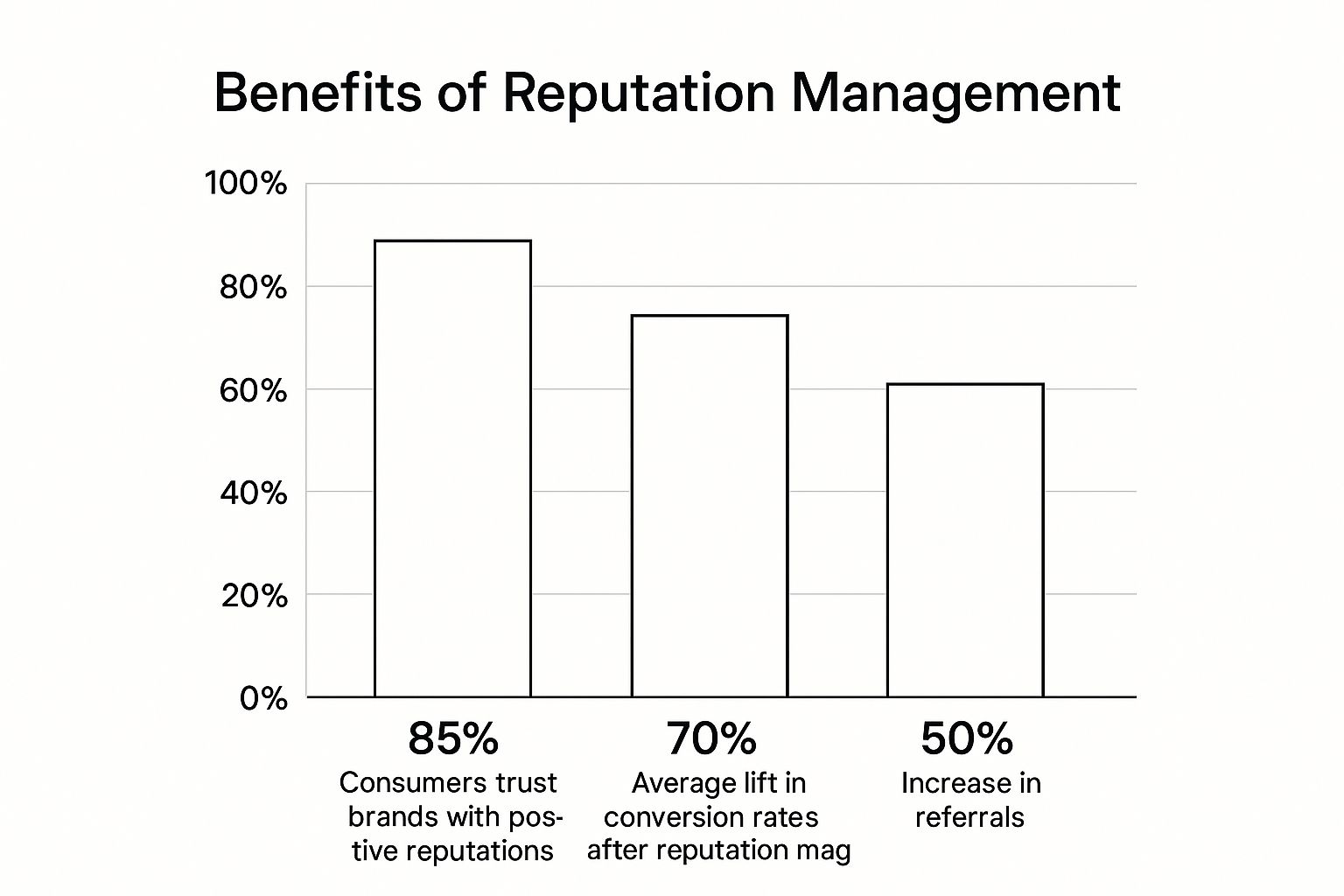When you boil it down, reputation management delivers four huge wins: more trust from your customers, a healthier bottom line, better search engine rankings, and the ability to weather a crisis. It’s really about taking control of the public conversation around your brand to build an image that attracts everything you want—from sales to top-tier employees.
Why Your Reputation Is Your Most Valuable Asset
In the business world, your brand’s reputation is the whole game. It’s not some fluffy marketing concept; it’s the bedrock of customer trust and the fuel for your growth.
Think of it just like a personal reputation. It takes ages to build through consistent, positive actions, but a single mistake can tarnish it in an instant. A great reputation walks into the room before you do, shaping how potential customers, partners, and employees see you before they’ve even had a single conversation with your team.
This guide isn’t about theory. We’re going to show you the real, tangible results you get from actively managing your reputation. We’ll break down how it builds rock-solid customer loyalty, directly drives revenue, and makes you more visible online. Getting a handle on why an online reputation is so important is the first step to turning it from a worry into a powerful asset.
Shifting from Defense to Offense
Too many businesses treat reputation management like a fire extinguisher—they only think about it when something is already burning. But the real magic happens when you go on the offense. Proactively building a positive narrative around your brand is one of the smartest investments you can make, and its benefits ripple through your entire company.
A great reputation is more than a shield; it’s a magnet. It attracts new customers, draws in the best talent, and creates a loyal community that will stand by you, even when challenges arise.
So, what does this proactive mindset look like in practice?
- Actively seek feedback: Don’t just sit back and wait for reviews. Encourage your happy customers to share their great experiences.
- Engage with all commentary: When you reply to both glowing praise and harsh criticism, you show everyone that you’re listening and genuinely care about getting it right.
- Control your search results: Making sure the first page of Google is filled with positive, accurate information about your brand is non-negotiable for making a killer first impression.
Once you make this shift, you stop just putting out fires and start building an asset that drives real, sustainable growth and protects your brand for years to come.
Building a Foundation of Customer Trust and Loyalty

In business today, trust is everything. It’s the currency that makes transactions happen and turns first-time buyers into lifelong fans. Without it, you’re just another faceless company, and customers will hesitate to take a chance on you.
This is where reputation management really shines. It’s not just about damage control; it’s about methodically building and protecting that invaluable trust. Think of your online reputation as your business’s resume. Every positive review is a stellar reference, and every complaint you handle with grace proves you’ve got character.
This foundation of trust doesn’t just appear overnight. It’s the result of consistent, positive interactions, being transparent, and genuinely caring about your customers’ happiness. When people see that you have a long track record of satisfying customers, they feel secure choosing you.
Turning Feedback into Lasting Loyalty
The real magic happens when you start engaging with customer feedback. This isn’t about just chasing five-star ratings; it’s about proving you’re listening. When you take the time to respond to both glowing reviews and critical comments, you show there are real, caring people behind the brand.
This simple act of engagement builds a powerful emotional connection. Customers who feel heard also feel valued, and that bond is what transforms them from simple buyers into vocal advocates for your brand. They’ll be the ones recommending you to friends and defending you online. For smaller companies, this community-building effect is a massive advantage. Our guide on reputation management for small business dives deeper into forging these crucial connections.
A strong reputation acts like a savings account of goodwill. You make small, consistent deposits by treating customers well and managing feedback transparently. When a problem inevitably arises, you have a deep reserve of trust to draw from.
The Quantifiable Impact of a Trusted Reputation
The link between a great reputation and customer trust isn’t just a gut feeling—the numbers tell the story loud and clear. When a brand’s reputation score goes from average to excellent, consumer trust can increase by a staggering 3.2 times.
Why does that matter? Because a whopping 83% of consumers say that trustworthiness is the most important emotional factor they have with their favorite brands.
On top of that, 62% of consumers say a company’s reputation is a major deciding factor when they’re about to make a purchase. That’s a direct line to your bottom line.
A trusted reputation does more than just bring in repeat business; it makes your brand resilient. It creates a loyal community that’s more likely to forgive an honest mistake and far more likely to spread the word about you. This cycle of trust and loyalty becomes a self-sustaining engine for growth, all powered by your commitment to managing how the world sees you.
How Positive Perception Drives Revenue and Conversions
A fantastic reputation isn’t just a nice-to-have; it’s a powerful sales engine working for your business around the clock. The way people see your brand connects directly to your bottom line, influencing how they find you, whether they trust you, and ultimately, if they decide to buy from you.
Think of online reviews as the digital-age version of word-of-mouth, but with a global reach. Before making a purchase, customers go on a fact-finding mission online, and their first stops are almost always Google and review sites. What they discover there instantly shapes their opinion of your brand.
The Financial Power of a Five-Star Rating
The connection between a strong reputation and more sales isn’t just a theory—it’s backed by hard numbers. People rely heavily on what others say online. In fact, 85% trust online reviews as much as personal recommendations from friends or family.
This social proof has a direct financial impact. For instance, data shows that every one-star increase in a Yelp rating can boost a business’s sales by up to 9%. This really highlights how one of the core benefits of reputation management is turning positive public opinion into real, measurable revenue.
This visual breaks down just how powerful a positive reputation can be for building trust, driving sales, and encouraging referrals.

The data speaks for itself. A higher star rating doesn’t just get you more clicks; it actively convinces potential customers who are on the fence. For a lot of people, seeing a four or five-star average is the bare minimum for even considering a business.
The table below shows just how much those little stars matter.
The Financial Impact of Online Star Ratings
This table illustrates the direct correlation between a business’s average star rating and its potential customer acquisition and revenue, based on consumer behavior data.
| Star Rating | Consumer Behavior Impact | Potential Business Outcome |
|---|---|---|
| 5 Stars | Seen as exceptional; builds immediate trust and preference. | Attracts premium customers; supports higher pricing. |
| 4 Stars | Considered a reliable and good choice by most consumers. | Strong conversion rates; consistent customer flow. |
| 3 Stars | Perceived as average or risky; customers hesitate. | Significantly lower conversion rates; price sensitivity increases. |
| 1-2 Stars | Viewed as untrustworthy; actively avoided by most. | Drastic loss of potential customers; severe revenue impact. |
As you can see, the difference between a 3-star and a 4-star rating can be the difference between a struggling business and a thriving one.
Commanding Better Pricing Through Trust
Beyond just driving more sales, a stellar reputation gives you more control over your pricing. When customers see your brand as reliable and high-quality, they’re often willing to pay a bit more for the confidence that comes with their purchase.
A strong reputation reduces the perceived risk for a customer. When trust is high, price becomes a less significant factor in the buying decision.
This is a huge advantage. It lets you position your business based on the value you provide, rather than getting stuck in a race to the bottom on price. It creates a shield against competitors who might try to undercut you, because your loyal customers know your brand delivers a better, more dependable experience.
- Premium Positioning: A trusted brand can charge more without scaring away customers.
- Reduced Price Sensitivity: Customers focus more on quality and reliability instead of just the cheapest price tag.
- Higher Customer Lifetime Value: Happy, trusting customers are far more likely to come back again and again.
Taking control of your online presence is how you unlock these financial benefits. If you’re looking for some practical next steps, our guide on how to improve your online reputation offers strategies you can start using today. When you invest in how your brand is perceived, you’re making a direct investment in its profitability.
How Your Reputation Fuels Your SEO

It’s easy to miss the direct line connecting your brand’s reputation to its search engine optimization (SEO). But the two are deeply intertwined. A stellar online reputation doesn’t just win over customers; it also sends powerful trust signals to search engines like Google.
Think about it from Google’s perspective. Its entire job is to show people the most trustworthy, relevant, and authoritative results. What’s a better sign of a trustworthy business than a constant stream of positive feedback from real customers? Every single good review acts like a vote of confidence, telling Google that you’re a business that delivers on its promises.
This connection is a game-changer for local businesses. When deciding who gets to the top of the local map pack, Google’s algorithm leans heavily on the quantity, quality, and consistency of your reviews. This means that actively encouraging customer feedback is one of the most direct ways to climb the local search rankings.
Turning Customer Feedback into SEO Gold
Online reviews do more than just build trust—they provide a massive, untapped source of fresh, user-generated content. This content is pure gold for SEO.
When customers describe their experience, they use the exact words and phrases other potential customers are typing into the search bar. A coffee shop customer might write about the “best iced latte in downtown” or a “quiet spot for remote work.” Suddenly, you’re ranking for long-tail keywords you never even thought to target.
In essence, managing your reputation is like crowdsourcing your keyword strategy. Each review organically weaves in the authentic language your customers use, making it easier for a much wider audience to find you.
This constant drip of new, relevant content keeps your online profiles looking active and important in Google’s eyes. It’s an effortless way to broaden your reach and align your business with what people are actually looking for.
Owning Your First Impression on Google
Ultimately, reputation management gives you control over your brand’s first impression on the search engine results page (SERP). Go ahead, search for your business name. What do you see?
A well-executed strategy ensures that the first page is dominated by positive, brand-controlled assets. We’re not just talking about your website. This includes:
- Polished Business Listings: Your Google Business Profile, Yelp page, and other key directories should be complete, accurate, and packed with glowing reviews.
- Positive News & Articles: Sharing good news and company achievements can help positive press rank for your brand name, pushing down anything negative.
- Active Social Media: Strong, engaging social profiles often rank on the first page, giving you another chance to tell your story your way.
By making sure these assets rank high, you build a digital fortress of positivity. You’re not just managing your reputation; you’re using SEO to turn your search results into a compelling highlight reel that builds trust and drives traffic before someone even clicks on your website.
Attracting Top Talent and Building Crisis Resilience
Beyond the more obvious perks like boosting sales or climbing up search rankings, reputation management has a couple of powerful, long-term benefits that often fly under the radar. These advantages are all about strengthening your company from the inside out—making you a more attractive place to work and fortifying you against the inevitable storms that come your way.
Think of your brand’s reputation as a deep well of goodwill. Every glowing review, every time you turn a customer complaint into a positive experience, and every piece of honest communication adds more water to that well.
So when a crisis hits—and it often does, whether it’s a product recall, a major service outage, or a nasty news story—you have a substantial reserve of trust to draw from. Customers and partners who already think highly of you are much more likely to give you the benefit of the doubt. They’ll pause and wait to hear your side of the story instead of immediately jumping on the bandwagon of negativity. This “trust buffer” can be the difference between a brand-ending catastrophe and a manageable hiccup, giving you the critical time needed to respond with a clear head.
Becoming a Magnet for the Best People
In today’s tight job market, your public image is one of your most effective recruiting tools. The best candidates aren’t just looking at salary anymore. They’re doing their homework, digging into your company culture, your values, and how you treat people—both customers and employees—long before they even consider sending in an application.
They’re scrolling through reviews on Glassdoor, checking out your social media presence, and paying close attention to how you handle public feedback. A fantastic reputation is a huge green flag, signaling a healthy work environment and a company that operates with integrity. It positions you as a destination employer, attracting motivated people who are looking for more than just a 9-to-5.
A strong public reputation is essentially an endorsement of your company culture. It tells potential hires that your business is a place where they can thrive, contribute meaningfully, and be proud of their work.
This isn’t just a hunch; it’s a top priority for business leaders. The data shows that 84% of CEOs now see brand and reputation as major risks to manage. From a hiring perspective, this is a no-brainer when you realize a whopping 68% of professionals admit they wouldn’t even apply to a company with a bad online reputation. You can dig into these numbers in the 2025 CEO Global Pulse report findings.
The Dual Advantage of a Strong Reputation
At the end of the day, managing your reputation is a core business strategy that works on two fronts. It shields you from external shocks while making your company a more desirable place for the very people you need to help you grow.
These two benefits feed into each other, creating a powerful positive loop:
- Attracting great talent leads to better products, smarter innovation, and world-class customer service.
- A stronger internal culture and superior service naturally lead to more positive customer experiences, which in turn builds an even more resilient reputation.
By actively shaping how your brand is perceived, you’re not just playing defense. You’re proactively building a more talented, robust, and respected organization from the ground up. It’s one of the most fundamental things you can do to ensure long-term, sustainable success.
Common Questions About Reputation Management

It’s one thing to understand why reputation management matters, but actually diving in brings up a whole new set of questions. To help bridge that gap between theory and real-world practice, let’s tackle some of the most common things people ask when they start taking control of their brand’s image.
Think of this as your practical cheat sheet for clearing up any confusion and getting confident about shaping your online narrative.
What Is the Difference Between Reputation Management and PR?
It’s easy to see why people get these two mixed up, but they play very different roles.
Think of Public Relations (PR) as your outbound microphone. It’s all about crafting your story and pushing it out to the world through press releases, media outreach, and positive announcements. PR is focused on broadcasting.
Reputation management, on the other hand, is about listening to what people are saying back. It’s a much broader, two-way street that involves:
- Keeping an eye on reviews and social media mentions.
- Engaging with feedback—the good, the bad, and the neutral.
- Actively working to influence what shows up when people Google your name.
So, while PR sends the message, reputation management handles the conversation that follows. The two work best when they’re in sync, but they aren’t the same job.
Can I Just Delete Bad Reviews?
This is probably the number one question we hear, and the short answer is almost always no. You can’t just scrub a legitimate negative review from the internet.
Review sites like Google or Yelp have strict policies. They’ll only take down a review if it violates their guidelines—think hate speech, spam, or a review for the wrong business. A genuinely unhappy customer sharing their honest (even if harsh) experience? That’s staying up.
Trying to get legitimate reviews deleted can backfire spectacularly if people find out. The best move is to face it head-on. A thoughtful, public response that addresses the customer’s issue and offers a solution shows everyone watching that you’re accountable. It builds far more trust than a perfect-but-unrealistic 5-star rating.
A well-handled negative review is an opportunity in disguise. It proves you’re transparent and can turn a frustrated customer into a vocal supporter.
How Quickly Will I See Results from This?
The timeline really depends on what you’re trying to achieve. Some wins can come surprisingly fast. For instance, if you launch a campaign to get more positive reviews, you could see your star rating tick up and start swaying new customers in a matter of weeks.
But the bigger picture stuff? That takes time. Changing a deep-seated negative perception or making a real dent in your search engine rankings is a long-term commitment. Building a rock-solid reputation is a marathon, not a sprint.
Generally, you should expect to see significant, lasting changes in how your brand is perceived after 6 to 12 months of consistent, dedicated work. It’s an ongoing investment, but one that pays off for years to come.
Ready to take control of your online narrative and turn customer feedback into your most powerful growth engine? Reviews To The Top provides the tools you need to monitor, manage, and magnify your reputation. Start building a five-star reputation today.
